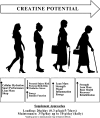Creatine in women's health: bridging the gap from menstruation through pregnancy to menopause
- PMID: 40371844
- PMCID: PMC12086928
- DOI: 10.1080/15502783.2025.2502094
Creatine in women's health: bridging the gap from menstruation through pregnancy to menopause
Abstract
Background: Creatine supplementation in women has gained attention for its potential benefits beyond muscle growth, including reproductive health, cognitive health and aging. Women exhibit distinct physiological differences from men, influenced by hormonal fluctuations during pre-menopause, pregnancy, and menopause, and these factors should be considered for their influence on creatine metabolism.
Objective: This review aims to provide a historical evaluation of creatine supplementation in women, its potential applications across female-specific life stages, recent research highlights, and targets for future research. The review also considers the impact of hormonal changes on creatine metabolism and effectiveness as a dietary supplementation.
Methods: This is a narrative overview of historical and recent research evaluating the effects of creatine in women.
Results: Early studies demonstrated the benefits of creatine on exercise performance in women, though they often overlooked menstrual cycle variability. Recent research has begun to account for these hormonal fluctuations, enhancing the understanding of creatine's applications. Creatine supplementation has shown positive effects on muscle strength, exercise performance, and body composition, particularly when combined with resistance training. Additionally, creatine may improve mood and cognitive function, potentially alleviating symptoms of depression. Emerging evidence suggests creatine's benefits during pregnancy and post-menopause, though data on perimenopausal women remains limited.
Conclusion: Creatine supplementation presents a promising strategy for enhancing various aspects of women's health across the lifespan. Future research should focus on optimizing dosing strategies, understanding long-term health implications, and exploring creatine's effects during pregnancy and perimenopause.
Keywords: Creatine monohydrate; female; nutrition; perimenopause; physiology; sleep.
Conflict of interest statement
ASR serves as a scientific advisor for Alzchem and Create Wellness. SJE serves as a scientific advisor for Alzchem.
Figures




References
-
- SPINS Marketing . SPINS [Internet]. State Suppl. 2023. 2023. Available from: https://www.spins.com/resources/blog/the-state-of-supplements-in-2023/
Publication types
MeSH terms
Substances
LinkOut - more resources
Full Text Sources
Medical
Miscellaneous
